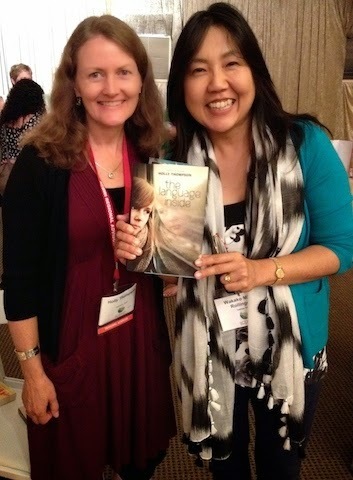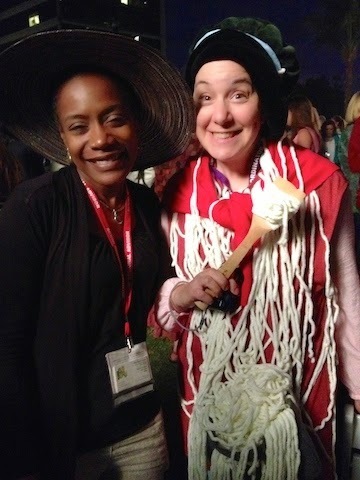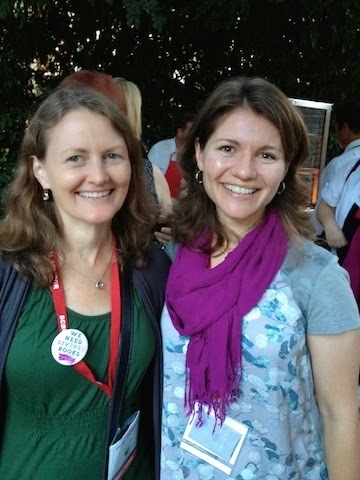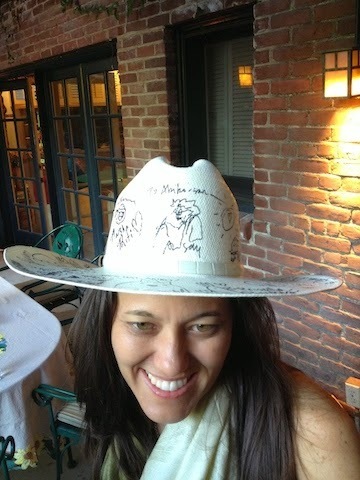Holly Thompson's Blog, page 22
January 22, 2015
Multimedia Poetry Projects
This fall I had the opportunity to teach Multimedia Poetry at GrubStreet, Boston's creative writing center. In this class we explored and experimented with multimedia poetry—poetry combined with video, still images, audio, typography, animation, movement, live performance, and other content forms. Each week we viewed and discussed example works—many from MovingPoems, as well as other sources, paying close attention to author-made multimedia projects (as opposed to collaborations). Students then brainstormed and began drafting or adapting their poems for the week’s project assignment. Students used whatever tech or traditional tools they had available to them, and each week in class students shared their previous week’s projects for workshop discussion.
Videopoet Martha McCollough generously visited our final multimedia poetry class, during which she viewed and commented on several class member projects, plus showed several of her works then discussed techniques, process, markets and more with us. It was a joy to meet her and learn more about her approach to creativing videopoems.
Soon I hope to be able to share links to some of the student works. In the meantime, here are some of the multimedia poetry projects that I worked on during the course.
---------------
Water Striders by Holly Thompson
Poem with still images and audio
This Day by Holly Thompson
Poem with video
Kaki-no-Tane by Holly Thompson
Poem text with whiteboard video and audio
Gently Weeping Here and Now by Holly Thompson
Spoken word performance video
If You Cross Kotohiki Bridge by Holly Thompson
Poem with dance performance
Published on January 22, 2015 19:40
January 19, 2015
Spoken Word in Arlington
Recently I was offered the chance to join other Boston area poets in Arlington for an evening of spoken word to be recorded by volunteers with Arlington Community Media Inc. It was wonderful to meet the other poets and to work with the capable and very patient crew.

I was second in the line-up and performed two poems, a spring poem and a fall poem: "Gently Weeping Here and Now" and "The Stand." And I confess--I peeked at the page for the second poem.
Here is the video link! Enjoy! I especially love Tim Hall's second poem (last in the line-up).
Special thanks to poet Erica Charis (fourth in the line-up) for gathering all of us together and to ACMi for making this all possible.

I was second in the line-up and performed two poems, a spring poem and a fall poem: "Gently Weeping Here and Now" and "The Stand." And I confess--I peeked at the page for the second poem.
Here is the video link! Enjoy! I especially love Tim Hall's second poem (last in the line-up).
Special thanks to poet Erica Charis (fourth in the line-up) for gathering all of us together and to ACMi for making this all possible.
Published on January 19, 2015 20:04
October 18, 2014
"Abscission" Haiku Movie
I've been dividing my time between Japan and Boston for the last year. Beginning on October 19-- tomorrow!--I'll be teaching a six-week Multimedia Poetry course at GrubStreet, the Boston creative writing center.
Here is "Abscission," a haiku movie, and one of my own examples of the various types of projects we'll be creating in this class.
Here is "Abscission," a haiku movie, and one of my own examples of the various types of projects we'll be creating in this class.
Published on October 18, 2014 11:29
October 15, 2014
My GrubStreet Classes
For those in the Boston area, this fall I will be teaching several classes at GrubStreet--Boston's creative writing center.

Starting on October 19, running for 6 Sundays, I'll be teaching Multimedia Poetry.
On Friday, Nov. 21, I'll be teaching Young Adult Writing: Finding and Developing Your Ideas.
On Saturday, Nov. 22, I'll be teaching Telling Stories in Verse: An Intro to Narrative Poetry and Verse Novels.
If you've never taken classes at GrubStreet, check out all their offerings. And please spread the word about these classes. Thanks!

Starting on October 19, running for 6 Sundays, I'll be teaching Multimedia Poetry.
On Friday, Nov. 21, I'll be teaching Young Adult Writing: Finding and Developing Your Ideas.
On Saturday, Nov. 22, I'll be teaching Telling Stories in Verse: An Intro to Narrative Poetry and Verse Novels.
If you've never taken classes at GrubStreet, check out all their offerings. And please spread the word about these classes. Thanks!
Published on October 15, 2014 08:10
September 24, 2014
Podcast: Holly Thompson!
Thank you to John King for featuring me in Episode #118: Holly Thompson! of The Drunken Odyssey--A Podcast About the Writing Life--in a discussion of my verse novel The Language Inside.

The podcast features me reading from The Language Inside from 00:00-06:31, an interview of me with John King from 17:50-53:00 and another brief reading from the novel at the very tale end of the episode at 1:07:00, after the essay read by Laryssa Wirstiuk. Here is the link to listen to the podcast.

Check out other episodes on The Drunken Odyssey, including interviews with Sharon Olds and Robert Pinsky, Edwidge Danticat and Koren Zailckas, Nikki Giovanni, Richard Blanco, Tomo contributor Kelly Luce, and many, many other writers. Have a look at the complete episode guide for The Drunken Odyssey, or peruse the episodes in reverse order in these episode pages
Thank you, John King, for interviewing me and for continuing to provide such a rich array of writerly podcasts!

The podcast features me reading from The Language Inside from 00:00-06:31, an interview of me with John King from 17:50-53:00 and another brief reading from the novel at the very tale end of the episode at 1:07:00, after the essay read by Laryssa Wirstiuk. Here is the link to listen to the podcast.

Check out other episodes on The Drunken Odyssey, including interviews with Sharon Olds and Robert Pinsky, Edwidge Danticat and Koren Zailckas, Nikki Giovanni, Richard Blanco, Tomo contributor Kelly Luce, and many, many other writers. Have a look at the complete episode guide for The Drunken Odyssey, or peruse the episodes in reverse order in these episode pages
Thank you, John King, for interviewing me and for continuing to provide such a rich array of writerly podcasts!
Published on September 24, 2014 20:29
September 20, 2014
Poetics of Loss
Finding myself in western Massachusetts in September, I was able to attend part of the Amherst Poetry Festival at the Emily Dickinson Museum and the Evergreens, home of Emily Dickinson's brother, in Amherst, MA.
 Emily Dickinson Museum
Emily Dickinson Museum

I was drawn particularly to a session moderated by poet Jan Freeman, NYU Creative Writing Program classmate and founder of Paris Press. The session focused on the Poetics of Loss, featuring poets Martin Espada, Rich Michelson and Doug Anderson. I've often written from and of loss, in my prose and poetry, and particularly in my verse novels Orchards and The Language Inside, so the questions addressed by the panel resonated deeply. The poets spoke about poets they read as comfort in times of loss, and they read from their own work.
 Rich Michelson, Jan Freeman, Martin Espada, Doug AndersonThe losses shared were monumental, both private and public, single grief and greater grief. Questions included--Who is comforted when we write about loss, either private or public--the writer? the reader? And how does one write through loss? How can a poet be of use in a time of communal grief? Each poet addressed these points as well as the difficulty of writing into grief, shaping poems of loss, and the dialectic I can't do this--I have to do this. Martin Espada gave a moving reading of "Heal the Cracks in the Bell of the World," his poem for the community of Newtown, Connecticut. "Writing is a hopeful act, a belief in a future," Michelson said. "The act of writing takes you momentarily out of the act of grieving," Espada added. We were reminded that poetry can be a gift to a stranger.
Rich Michelson, Jan Freeman, Martin Espada, Doug AndersonThe losses shared were monumental, both private and public, single grief and greater grief. Questions included--Who is comforted when we write about loss, either private or public--the writer? the reader? And how does one write through loss? How can a poet be of use in a time of communal grief? Each poet addressed these points as well as the difficulty of writing into grief, shaping poems of loss, and the dialectic I can't do this--I have to do this. Martin Espada gave a moving reading of "Heal the Cracks in the Bell of the World," his poem for the community of Newtown, Connecticut. "Writing is a hopeful act, a belief in a future," Michelson said. "The act of writing takes you momentarily out of the act of grieving," Espada added. We were reminded that poetry can be a gift to a stranger.
The festival features readings by western Massashusetts poets, discussions, poetry picnic, quirky events and the annual Emily Dickinson Poetry Marathon--a reading of all 1,789 of Dickinson's poems out loud in the house where they were written.


If you are in Amherst in September, the Amherst Poetry Festival is a wonderful all-weekend event in a perfect setting for sharing and absorbing poetry.
 Emily Dickinson Museum
Emily Dickinson Museum

I was drawn particularly to a session moderated by poet Jan Freeman, NYU Creative Writing Program classmate and founder of Paris Press. The session focused on the Poetics of Loss, featuring poets Martin Espada, Rich Michelson and Doug Anderson. I've often written from and of loss, in my prose and poetry, and particularly in my verse novels Orchards and The Language Inside, so the questions addressed by the panel resonated deeply. The poets spoke about poets they read as comfort in times of loss, and they read from their own work.
 Rich Michelson, Jan Freeman, Martin Espada, Doug AndersonThe losses shared were monumental, both private and public, single grief and greater grief. Questions included--Who is comforted when we write about loss, either private or public--the writer? the reader? And how does one write through loss? How can a poet be of use in a time of communal grief? Each poet addressed these points as well as the difficulty of writing into grief, shaping poems of loss, and the dialectic I can't do this--I have to do this. Martin Espada gave a moving reading of "Heal the Cracks in the Bell of the World," his poem for the community of Newtown, Connecticut. "Writing is a hopeful act, a belief in a future," Michelson said. "The act of writing takes you momentarily out of the act of grieving," Espada added. We were reminded that poetry can be a gift to a stranger.
Rich Michelson, Jan Freeman, Martin Espada, Doug AndersonThe losses shared were monumental, both private and public, single grief and greater grief. Questions included--Who is comforted when we write about loss, either private or public--the writer? the reader? And how does one write through loss? How can a poet be of use in a time of communal grief? Each poet addressed these points as well as the difficulty of writing into grief, shaping poems of loss, and the dialectic I can't do this--I have to do this. Martin Espada gave a moving reading of "Heal the Cracks in the Bell of the World," his poem for the community of Newtown, Connecticut. "Writing is a hopeful act, a belief in a future," Michelson said. "The act of writing takes you momentarily out of the act of grieving," Espada added. We were reminded that poetry can be a gift to a stranger.The festival features readings by western Massashusetts poets, discussions, poetry picnic, quirky events and the annual Emily Dickinson Poetry Marathon--a reading of all 1,789 of Dickinson's poems out loud in the house where they were written.


If you are in Amherst in September, the Amherst Poetry Festival is a wonderful all-weekend event in a perfect setting for sharing and absorbing poetry.
Published on September 20, 2014 21:54
August 8, 2014
SCBWI Summer Conference!
Last week at this time I was with over 1,200 other children's book people at the annual SCBWI Summer Conference. This is my tenth year as SCBWI Japan Regional Advisor, and this was my fifth time to attend the conference in sunny LA.

The SCBWI staff members were amazing, as always. Here they are standing still for a nanosecond at the regional team meeting the day before the conference, which consisted of three full days plus a day of writing and illustration intensives.

In addition to attendees from the U.S., 19 countries were represented. Here are a few of the international folk at the international social.

And here are the four of us representing Japan.
 Avery Fischer Udagawa, me, Li-hsin Tu, Kazumi WildsConference highlights for me included meeting up with all the other regional advisors and regional team members, the conference keynotes, editor panels, a lunchtime diversity chat, breakout sessions on writing, and a brilliant session on creating anticipation in picture books by Eugene Yelchin, author of Breaking Stalin's Nose.
Avery Fischer Udagawa, me, Li-hsin Tu, Kazumi WildsConference highlights for me included meeting up with all the other regional advisors and regional team members, the conference keynotes, editor panels, a lunchtime diversity chat, breakout sessions on writing, and a brilliant session on creating anticipation in picture books by Eugene Yelchin, author of Breaking Stalin's Nose.
SCBWI is like one giant welcoming family, and there are friends, like Wakako Rollinger, who I enjoy reconnecting with each time I attend the LA conference.
 me with Wakako Miya RollingerMy literary agent Jamie Weiss Chilton is based in LA, so there were opportunities to meet with her and two of her star clients, Salina Yoon and Lamar Giles.
me with Wakako Miya RollingerMy literary agent Jamie Weiss Chilton is based in LA, so there were opportunities to meet with her and two of her star clients, Salina Yoon and Lamar Giles.
 Jamie Weiss Chilton, me, Lamar Giles, Salina YoonAnd Jamie took us to John O'Groats for breakfast and lunch.
Jamie Weiss Chilton, me, Lamar Giles, Salina YoonAnd Jamie took us to John O'Groats for breakfast and lunch.
 me with Jamie Weiss ChiltonSaturday night was the pool party with an Old Italy theme in honor of Tomie dePaola's 80th birthday. There were plenty of Strega Nona characters, gondoliers, pasta...
me with Jamie Weiss ChiltonSaturday night was the pool party with an Old Italy theme in honor of Tomie dePaola's 80th birthday. There were plenty of Strega Nona characters, gondoliers, pasta...

and . . . a familiar looking prince. You could quickly tell the illustrator folks from the writer folks at this party.

There was time for bonding with other verse novelists
 me with Caroline Starr Roseand eating tacos while speaking Japanese.
me with Caroline Starr Roseand eating tacos while speaking Japanese.
 Kazumi Wilds, Avery Fischer UdagawaIt was great to view the portfolio showcase, as well, and to meet illustrators like Akiko White, winner of the 2014 Tomie de Paola Award,
Kazumi Wilds, Avery Fischer UdagawaIt was great to view the portfolio showcase, as well, and to meet illustrators like Akiko White, winner of the 2014 Tomie de Paola Award,

with a great hat of signatures, including Allen Say's.

There's so much I could write about the LA conference but for now, why not head over to the Official SCBWI Conference Blog to read highlights from sessions and keynotes, including Megan McDonald, Maggie Steifvater, Tomie Depaola, Cynthia Kadohata, Linda Sue Park and Judy Blume.

And to make a great conference even sweeter, I was upgraded to business class on my flight back to Boston.
Thank you to SCBWI for all of the inspiration. I've been writing nonstop since my return.

The SCBWI staff members were amazing, as always. Here they are standing still for a nanosecond at the regional team meeting the day before the conference, which consisted of three full days plus a day of writing and illustration intensives.

In addition to attendees from the U.S., 19 countries were represented. Here are a few of the international folk at the international social.

And here are the four of us representing Japan.
 Avery Fischer Udagawa, me, Li-hsin Tu, Kazumi WildsConference highlights for me included meeting up with all the other regional advisors and regional team members, the conference keynotes, editor panels, a lunchtime diversity chat, breakout sessions on writing, and a brilliant session on creating anticipation in picture books by Eugene Yelchin, author of Breaking Stalin's Nose.
Avery Fischer Udagawa, me, Li-hsin Tu, Kazumi WildsConference highlights for me included meeting up with all the other regional advisors and regional team members, the conference keynotes, editor panels, a lunchtime diversity chat, breakout sessions on writing, and a brilliant session on creating anticipation in picture books by Eugene Yelchin, author of Breaking Stalin's Nose. SCBWI is like one giant welcoming family, and there are friends, like Wakako Rollinger, who I enjoy reconnecting with each time I attend the LA conference.
 me with Wakako Miya RollingerMy literary agent Jamie Weiss Chilton is based in LA, so there were opportunities to meet with her and two of her star clients, Salina Yoon and Lamar Giles.
me with Wakako Miya RollingerMy literary agent Jamie Weiss Chilton is based in LA, so there were opportunities to meet with her and two of her star clients, Salina Yoon and Lamar Giles. Jamie Weiss Chilton, me, Lamar Giles, Salina YoonAnd Jamie took us to John O'Groats for breakfast and lunch.
Jamie Weiss Chilton, me, Lamar Giles, Salina YoonAnd Jamie took us to John O'Groats for breakfast and lunch. me with Jamie Weiss ChiltonSaturday night was the pool party with an Old Italy theme in honor of Tomie dePaola's 80th birthday. There were plenty of Strega Nona characters, gondoliers, pasta...
me with Jamie Weiss ChiltonSaturday night was the pool party with an Old Italy theme in honor of Tomie dePaola's 80th birthday. There were plenty of Strega Nona characters, gondoliers, pasta...
and . . . a familiar looking prince. You could quickly tell the illustrator folks from the writer folks at this party.

There was time for bonding with other verse novelists
 me with Caroline Starr Roseand eating tacos while speaking Japanese.
me with Caroline Starr Roseand eating tacos while speaking Japanese. Kazumi Wilds, Avery Fischer UdagawaIt was great to view the portfolio showcase, as well, and to meet illustrators like Akiko White, winner of the 2014 Tomie de Paola Award,
Kazumi Wilds, Avery Fischer UdagawaIt was great to view the portfolio showcase, as well, and to meet illustrators like Akiko White, winner of the 2014 Tomie de Paola Award,
with a great hat of signatures, including Allen Say's.

There's so much I could write about the LA conference but for now, why not head over to the Official SCBWI Conference Blog to read highlights from sessions and keynotes, including Megan McDonald, Maggie Steifvater, Tomie Depaola, Cynthia Kadohata, Linda Sue Park and Judy Blume.

And to make a great conference even sweeter, I was upgraded to business class on my flight back to Boston.
Thank you to SCBWI for all of the inspiration. I've been writing nonstop since my return.
Published on August 08, 2014 21:51
July 8, 2014
Mikan Farming Solo
Today I visited the mikan (mandarin orange) farmer in Shizuoka Prefecture where I did an eighteen-month mikan cultivation apprenticeship as research for my YA novel Orchards (as well as an adult novel and picture book not yet published).
It had been much too long since I'd visited the farm, and sadly, in the interim, the farmer's wife, who'd shared so much family and village lore with me, had passed away. Several years before, the grandfather and grandmother had passed away. So now, with his two sons both employed outside of the farm district, and after years with three generations in the same household, the farmer finds himself living alone and tending to multiple mountainside mikan groves solo.
 Outside a storage shed, prepping a chain saw
Outside a storage shed, prepping a chain saw
In Shizuoka, after mikan trees blossom in May, the rainy months of June and July are somewhat relaxed for mikan farmers--a time for grass cutting, fertilizing, and pruning of dead wood. Soon the endless job of thinning of young fruit will begin. This year, unusually heavy February snow had damaged many mikan trees, so today we did some cutting and hauling of dead branches.
During a break, we sat and talked about mikan and the farm and the overwhelming difficulty of farming solo. Having spent months with the family on tasks we did as a foursome--farmer, wife, eldest son and me while the grandmother tended the vegetable garden and saw to the household chores--I sympathized and marvelled at the enormity of the job. As we were discussing which tasks were hardest to do alone, the farmer said, "But that's not what's difficult. What's toughest is the end of the work day."
 Solo farmer
Solo farmer
And his eldest son? "All the young men seem to want to work for companies. It's an easier lifestyle. They don't have to get dirty." Will the eldest, now married with young children, move back? "He wants to. It's a good life here." But, he acknowledged, farm life is demanding for wives of farmers.
My hope, of course, is that soon the house will be full again with family, that this solo stint won't be for long.
We cut and hauled branches in groves where I had once learned and practiced grafting. We inspected damage by the wild boars that roam the hills, and we studied this year's young mikan.
 Young gokuwase early mikan
Young gokuwase early mikan
Finally we cut some huge amanatsu mikan--sour like grapefruit--for me to bring home. We'll peel and eat some of them fresh, and I might try making some marmalade.
 amanatsu mikan--a grapefruit like citrus
amanatsu mikan--a grapefruit like citrus
I hope to visit the farm again soon to help out. I miss his wife, the grandparents, the house full of family. I miss that satisfying outdoor farm work. And I love those mountains, the sea, the village, the community. It is a good life in rural Japan.

It had been much too long since I'd visited the farm, and sadly, in the interim, the farmer's wife, who'd shared so much family and village lore with me, had passed away. Several years before, the grandfather and grandmother had passed away. So now, with his two sons both employed outside of the farm district, and after years with three generations in the same household, the farmer finds himself living alone and tending to multiple mountainside mikan groves solo.
 Outside a storage shed, prepping a chain saw
Outside a storage shed, prepping a chain sawIn Shizuoka, after mikan trees blossom in May, the rainy months of June and July are somewhat relaxed for mikan farmers--a time for grass cutting, fertilizing, and pruning of dead wood. Soon the endless job of thinning of young fruit will begin. This year, unusually heavy February snow had damaged many mikan trees, so today we did some cutting and hauling of dead branches.
During a break, we sat and talked about mikan and the farm and the overwhelming difficulty of farming solo. Having spent months with the family on tasks we did as a foursome--farmer, wife, eldest son and me while the grandmother tended the vegetable garden and saw to the household chores--I sympathized and marvelled at the enormity of the job. As we were discussing which tasks were hardest to do alone, the farmer said, "But that's not what's difficult. What's toughest is the end of the work day."
 Solo farmer
Solo farmerAnd his eldest son? "All the young men seem to want to work for companies. It's an easier lifestyle. They don't have to get dirty." Will the eldest, now married with young children, move back? "He wants to. It's a good life here." But, he acknowledged, farm life is demanding for wives of farmers.
My hope, of course, is that soon the house will be full again with family, that this solo stint won't be for long.
We cut and hauled branches in groves where I had once learned and practiced grafting. We inspected damage by the wild boars that roam the hills, and we studied this year's young mikan.
 Young gokuwase early mikan
Young gokuwase early mikanFinally we cut some huge amanatsu mikan--sour like grapefruit--for me to bring home. We'll peel and eat some of them fresh, and I might try making some marmalade.
 amanatsu mikan--a grapefruit like citrus
amanatsu mikan--a grapefruit like citrusI hope to visit the farm again soon to help out. I miss his wife, the grandparents, the house full of family. I miss that satisfying outdoor farm work. And I love those mountains, the sea, the village, the community. It is a good life in rural Japan.

Published on July 08, 2014 06:41
June 6, 2014
The Language Inside Accolades
I'm happy to report on some nice accolades that my verse novel The Language Inside has received this spring. The Language Inside is a coming of age story that depicts language both spoken and unspoken, draws from poetry that crosses boundaries, and has cultural connections to Japan, Cambodia and the U.S.
I'm so pleased with recognition this book has received from both adult and young adult readers. Thank you, thank you, thank you, thank you!

Bank Street 2014 Best Children's Books of the Year in the 14 and over Coming of Age Category

YALSA 2014 Best Fiction for Young Adults

2014 Notable Children's Books in the English Language Arts from the Children's Literature Assembly

Librarians' Choices a project under the direction of Sylvia Vardell

I'm so pleased with recognition this book has received from both adult and young adult readers. Thank you, thank you, thank you, thank you!

Bank Street 2014 Best Children's Books of the Year in the 14 and over Coming of Age Category

YALSA 2014 Best Fiction for Young Adults

2014 Notable Children's Books in the English Language Arts from the Children's Literature Assembly

Librarians' Choices a project under the direction of Sylvia Vardell

Published on June 06, 2014 17:56
May 20, 2014
Okirigishi Hike
Today I walked a loop trail from Omachi in Kamakura to the Mandarado cave tombs in Zushi (which are open on weekends from now through June 8), then to the Okirigishi area to the Zushi Highlands, up and over the steep Kinubariyama trail down to the Dengakuzushi road that follows the river back to central Kamakura.
The Okirigishi area of cut and eroded rock now has its own viewing trail. The main trail to the Zushi Highlands run along the top of the cliffs, but now there's a sign guiding hikers to a freshly laid woodchip path that winds along the base of the cliffs.

Okirigishi (大切岸) which runs along the Kamakura/Zushi border is a length of cliffs from 5 to 10 meters high and about 800 meters long that resembles a long folding screen. In the Kamakura Era (1185-1333) the cliffs may have played a role in the defenses of Kamakura. Also, centuries ago, rock was cut away from these cliffs , and the sandstone has eroded over time to create beautiful striations, hollows, projections and curves that follow the contour of the hills.







Okirigishi is yet another of the many hidden treasures among the hills in and around Kamakura (see posts here and here). And hiking on a weekday or early in the morning yields blissful quiet. Today we encountered only a few other people, and bush warblers serenaded us the whole way.
The Okirigishi area of cut and eroded rock now has its own viewing trail. The main trail to the Zushi Highlands run along the top of the cliffs, but now there's a sign guiding hikers to a freshly laid woodchip path that winds along the base of the cliffs.

Okirigishi (大切岸) which runs along the Kamakura/Zushi border is a length of cliffs from 5 to 10 meters high and about 800 meters long that resembles a long folding screen. In the Kamakura Era (1185-1333) the cliffs may have played a role in the defenses of Kamakura. Also, centuries ago, rock was cut away from these cliffs , and the sandstone has eroded over time to create beautiful striations, hollows, projections and curves that follow the contour of the hills.







Okirigishi is yet another of the many hidden treasures among the hills in and around Kamakura (see posts here and here). And hiking on a weekday or early in the morning yields blissful quiet. Today we encountered only a few other people, and bush warblers serenaded us the whole way.
Published on May 20, 2014 02:33



